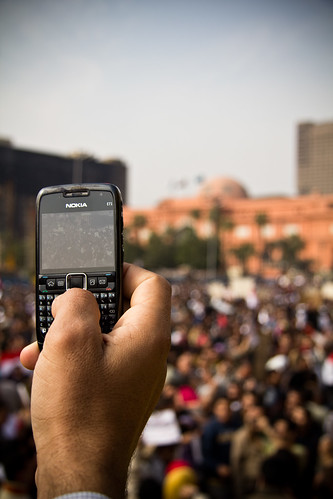Guest post by Graham Hough-Cornwell
This post is not a content analysis of the recent tweets about Egypt. Their volume is staggering and would demand a more rigorous analysis, both qualitative and quantitative, than is possible at this time. Just click on the hash tag “#Egypt,” wait a minute to refresh, and you will have hundreds of new tweets in dozens of different languages.
There are calls to action, directions for protesters, jokes, cracks about Anderson Cooper, links to video and photo galleries, and the latest in negotiations between the Mubarak regime and the White House. One thing worth noting though: for all that Twitter activity, the pro-Mubarak crowd has been notably quiet, even silent at times.

Anti Mubarak demonstration at Tahiri Square, 2/1/2011. Credit: darkroom productions/Flickr
Setting aside the trends and messages of the thousands (millions?) of tweets out there, it is fascinating to look at the flexibility and agility of the protest itself. Despite government crackdowns and blockages of webpages – as early as the first day of protesting – and cell phone networks, the flow of news and information never ceased.
Even after the government effectively shut off the entire internet, tweets continued to pour in, live from Tahrir Square and other locales across Cairo, Alexandria, and Suez.
Four of five cell phone providers in Egypt were shut down within three days of the first major protest on January 25. Internet then followed, causing a 90 percent drop in data traffic to and from Egypt. The only company to remain in operation was Noor, also incidentally the provider for the Egyptian Stock Exchange.
We are still witnessing the reaction to and consequences of the service stoppages. In the New York Times, Jim Cowie of Renesys, a New Hampshire company that monitors global internet traffic, commented, “In a fundamental sense, it’s as if you rewrote the map and they are no longer a country.”
Such drastic overstatements misunderstand the impact of the internet blockage and its relation to the protests. What map was being “rewritten,” exactly? Protests hardly seemed to slow despite the lack of mobile phone and internet access, and, while Egyptians may not have been able to live-blog from the 6th of October Bridge on their smart phones, the world outside Egypt did not want for eyewitness, up-to-the-minute reports. If there was indeed a new map, Egypt and Tahrir Square were at the very heart of it.
Tweeters in turn reacted strongly to assertions like Cowie’s, rejecting the power of Twitter and Facebok to fuel the revolution.
@SultanAlQassemi There was no twitter, mobile phones, Satellite TV, internet, facebook, sms or youtube when Romanians overthrew Ceausescu in 1989. #Jan25
@altivexfoundry #Egypt #Tunisia “It was not a twitter revolution … It was a revolution … Covered by twitter” #jnb5feb
@asteris Won’t be RTing anything w. words Twitter (or Facebook) & revolution adjacent to each other; disrespectful towards the brave ppl of #Egypt
Granted, the majority of tweets still acclaim the power of a Twitter Revolution, it is difficult to deny the momentum gained after Twitter and other social media became increasingly inaccessible as both ways to report developments and ways to read about them. For the majority of Egyptian people, news of protests and calls for ever larger numbers of demonstrators came through some other medium.
With the help of Google’s Speak2Tweet and mechanisms like Voice to Tweet Egyptians were able to place phone calls – from land lines, too – and to have their voice mails turned into Tweets and posted online. While these adaptations attest to the flexibility of Twitter, they also indicate the agility of the protesters to organize and maneuver without the help of those online organizing tools.
Egyptian comedian Haisam Abu-Samra described the increased focus as a result of the shutdown of communications:
“After suddenly getting thrust into an offline world not only did I learn firsthand how irreversibly entrenched the Internet has became in my life and the lives of other Egyptians: I saw how its loss could help us focus our attention on what was happening in reality. The disconnection gave us the chance to prove that we were just as strong, if not stronger, in the face of an authoritarian self-imposed embargo – a decision that itself illustrated the government’s fears, not its strengths.”
The role of social media in the uprising is still up for debate. But Cowie’s claim that the internet blockage reconfigured some kind of map obscures an important point: the sudden absence of activity in Egypt actually made the protests all the more noticeable. It directed attention to the gap. It made us refocus on what was not there but should have been.
Graham Hough-Cornwell has an M.A. from The Elliott School of International Affairs in Middle East Studies. He is a research assistant for the Institute for Middle East Studies and a freelance writer. His interests include culture, geography, and North African history.